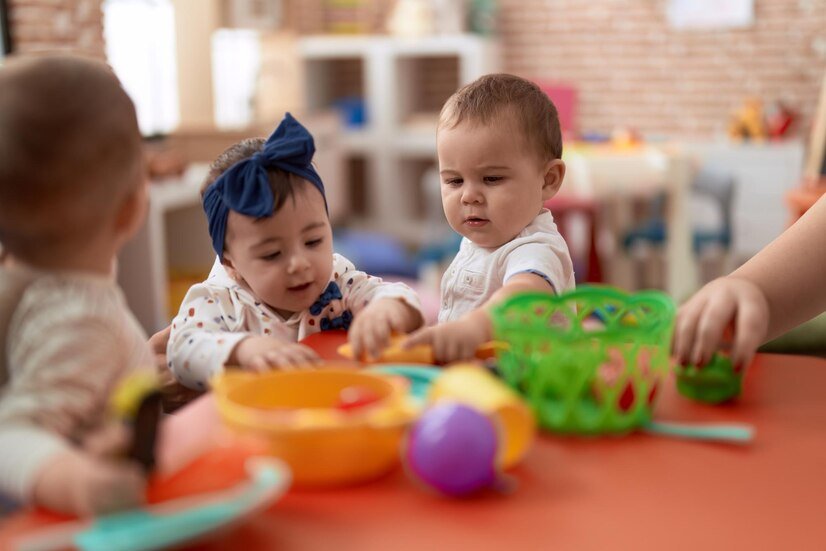Welcome to our blog post on the fascinating world of early childhood development! Have you ever wondered how children grow and develop during those crucial first few years of their lives? Early childhood development is a captivating field that explores the incredible journey from infancy to preschool age. In this article, we will delve into what exactly early childhood development entails, why it is so important, and how we can support healthy growth in young children. So buckle up and get ready to embark on an enlightening exploration of this vital stage in human development!
Table of Contents
Definition of Early Childhood Development
What exactly do we mean by early childhood development? Well, it refers to the rapid physical, cognitive, emotional, and social changes that occur in children from birth to around the age of eight. It is a dynamic period where children acquire essential skills and abilities that form the foundation for future learning and well-being.
During this stage, children undergo remarkable transformations in various aspects of their lives. Physically, they experience immense growth in height, weight, strength, and motor skills. Cognitive development involves the acquisition of language skills and problem-solving abilities as their brains develop rapidly.
Emotionally and socially, young children begin to navigate their feelings and learn how to interact with others. They start developing a sense of self-identity while also exploring social interactions through play.
Early childhood development is not just about reaching milestones or ticking off checkboxes; it’s a holistic approach that recognizes each child’s unique journey. Every child develops at their own pace but providing them with nurturing environments rich in stimulating experiences can support their overall growth.
Understanding the definition of early childhood development sets the stage for recognizing its significance in shaping a child’s future. So now let’s dive deeper into why this phase is so crucial!
Importance of Early Childhood Development
Early childhood development plays a crucial role in shaping a child’s future. During this period, children experience rapid growth and development in various aspects of their lives, including physical, cognitive, emotional, and social development. Investing time and effort into promoting healthy early childhood development is essential for laying a strong foundation for lifelong learning and well-being.
One key aspect of early childhood development is the formation of neural connections in the brain. The experiences children have during these formative years greatly influence their brain architecture. Stimulating environments filled with positive interactions help to nurture these connections and promote optimal brain development.
Furthermore, early childhood experiences can significantly impact a child’s overall health outcomes later in life. Research has shown that children who receive quality care and support during their early years are more likely to develop healthier habits as adults.
Moreover, early childhood education not only prepares children academically but also enhances their social skills. It provides them with opportunities to interact with peers and develop important life skills such as problem-solving, critical thinking, communication abilities, empathy, and self-regulation.
In addition to academic benefits, investing in early childhood development yields economic advantages as well. Studies have indicated that high-quality early education programs result in higher graduation rates, increased employability prospects, reduced crime rates,and improved overall productivity within society.
Overall,the importance of focusing on early childhood development cannot be overstated.
It sets the stage for a child’s future success by providing them with the necessary tools to navigate through life’s challenges.
The investment made during these crucial years lays the groundwork for building resilient individuals who can thrive both personally and professionally
Stages of Early Childhood Development
Early childhood is a critical period in a child’s life, filled with rapid growth and development. Understanding the different stages of early childhood development can help parents and caregivers support their children’s overall well-being.
During the first stage, which spans from birth to two years old, infants experience significant physical changes. They learn to roll over, crawl, walk, and eventually run. Cognitive development also takes place as they begin to recognize objects and understand cause-and-effect relationships.
The second stage covers ages two to six years old when children become more independent and curious about the world around them. Their language skills improve rapidly during this time as they start forming sentences and expressing their thoughts verbally.
From six to twelve years old comes the third stage of early childhood development. This period is marked by increased social interactions as children spend more time with peers at school or extracurricular activities. They develop friendships, learn cooperation skills, and begin understanding societal rules.
Adolescence marks the final stage of early childhood development. During this phase (typically starting around age 12), young people undergo significant emotional and physical changes as they transition into adulthood.
Understanding these stages allows parents and caregivers to provide appropriate support based on each child’s unique needs throughout their early years. By fostering a nurturing environment that encourages exploration, learning opportunities, social interaction, and emotional well-being during these crucial stages of development contribute positively to a child’s overall growth journey.
READ: Online Classes through the Early Childhood Academy
Factors that Affect Early Childhood Development
Early childhood development is influenced by a wide range of factors, which can have either positive or negative impacts on a child’s growth and well-being. These factors encompass various aspects of a child’s environment, including their family, community, and broader societal context.
The quality of interactions within the family plays a crucial role in early childhood development. Positive and nurturing relationships with parents or caregivers contribute to a child’s emotional security and sense of belonging. On the other hand, stressful or chaotic home environments can hinder their cognitive, social, and emotional development.
Access to quality healthcare services is essential for optimal early childhood development. Regular health check-ups ensure that children receive necessary immunizations and screenings for developmental delays. Additionally, proper nutrition during this critical period supports physical growth and brain development.
The availability of educational resources significantly influences early childhood development. Children who have access to books, stimulating toys, and educational programs tend to develop stronger language skills and cognitive abilities than those who do not.
Promoting Healthy Early Childhood Development
Creating an environment that supports healthy early childhood development is crucial for setting the foundation for a child’s future well-being. There are various ways in which parents, caregivers, and educators can promote optimal growth and development during these formative years.
First and foremost, providing a nurturing and loving environment is essential. Children thrive when they feel safe, secure, and loved, so offering plenty of affection, attention, and positive reinforcement can go a long way in fostering their overall development.
Next, engaging children in stimulating activities that encourage exploration and learning is vital. This can include age-appropriate toys, books, puzzles, arts and crafts materials – anything that encourages curiosity and imagination.
Furthermore, establishing routines helps children develop a sense of structure and stability. Regular mealtimes, bedtimes, playtimes – all help create predictability which allows children to feel secure.
Encouraging regular physical activity is also crucial. Whether it’s through outdoor play or organized sports activities (if appropriate), getting kids moving helps enhance their motor skills while promoting overall health.
Lastly but not least importantly , fostering social interactions with peers through playdates or involvement in group activities promotes social-emotional learning while developing communication skills.
By implementing these strategies within the home or educational settings ensures that young children have every opportunity to reach their full potential during this critical stage of life.
Common Issues in Early Childhood Development
During the early years of a child’s life, there can be various challenges and issues that affect their development. While every child is unique and may face different hurdles, there are some common issues that parents and caregivers should be aware of.
One common issue is language delay. Some children may struggle with speaking or understanding words at the same pace as their peers. This can impact their ability to communicate effectively, which could lead to frustration and difficulties in social interactions.
Another issue is behavioral problems. It is not uncommon for young children to exhibit challenging behaviors such as tantrums or aggression. These behaviors can stem from various factors like lack of appropriate discipline, poor emotional regulation skills, or even underlying developmental disorders.
Sensory processing difficulties are also prevalent among young children. Some kids may have heightened sensitivity to certain sensory inputs like sound, touch, or taste while others may seek more sensory stimulation than usual. These sensitivities or seeking behaviors can affect their daily functioning and engagement with the environment.
Furthermore, mental health concerns can emerge during early childhood development. Anxiety disorders, attention-deficit/hyperactivity disorder (ADHD), and autism spectrum disorders are examples of conditions that might manifest at this stage of life. Identifying these conditions early on allows for timely intervention and support.
Parental influence plays a significant role in a child’s overall development. If parents are experiencing challenges themselves such as financial stressors or relationship conflicts it can impact the child’s well-being too.
Recognizing these common issues in early childhood development is crucial for parents and caregivers alike. Early identification allows for proper interventions tailored to each child’s needs so they can thrive both now and throughout their lives
Conclusion
In this article, we have explored the fascinating world of early childhood development. We have defined what it means and discussed its importance in shaping a child’s future. We have also delved into the stages of early childhood development and identified various factors that can influence it.
Early childhood development is a crucial period in a child’s life as it sets the foundation for their cognitive, emotional, social, and physical well-being. It lays the groundwork for future learning and success, making it imperative to prioritize these formative years.
Parents, caregivers, educators, and society as a whole play a significant role in promoting healthy early childhood development. By providing love, support, nurturing environments, access to quality education and healthcare services, we can give children the best possible start in life.
However, there are common issues that may arise during this period such as developmental delays or challenges with behavior regulation. Recognizing these issues early on is vital so that appropriate interventions can be implemented to ensure optimal growth and development.
The field of early childhood development continues to evolve with ongoing research and advancements in understanding how best to support young children’s needs. By staying informed about current knowledge and practices through resources like this blog post (insert internal link here), we can contribute positively towards fostering thriving futures for our little ones.
Remember – every child is unique! Understanding their individual strengths and challenges will guide us in tailoring approaches that suit their specific needs. Let’s embrace the wonder of early childhood development together!
So go ahead – explore this incredible journey of growth alongside your little ones. Witness their minds expand like never before as they navigate each stage of early childhood development with curiosity and resilience!





